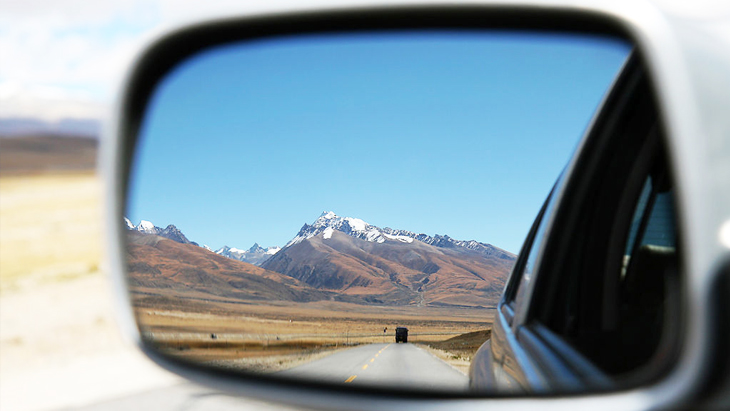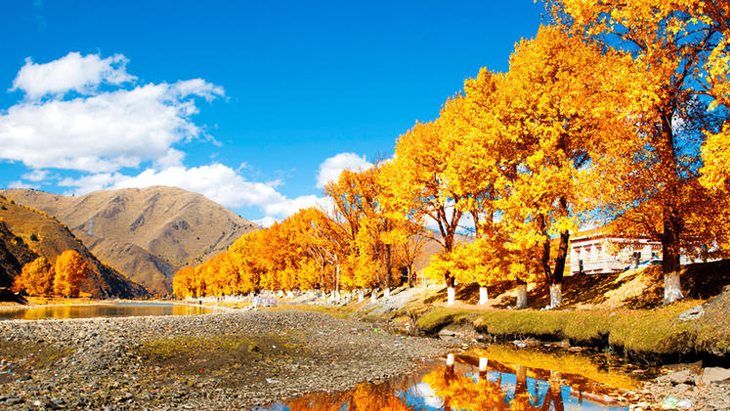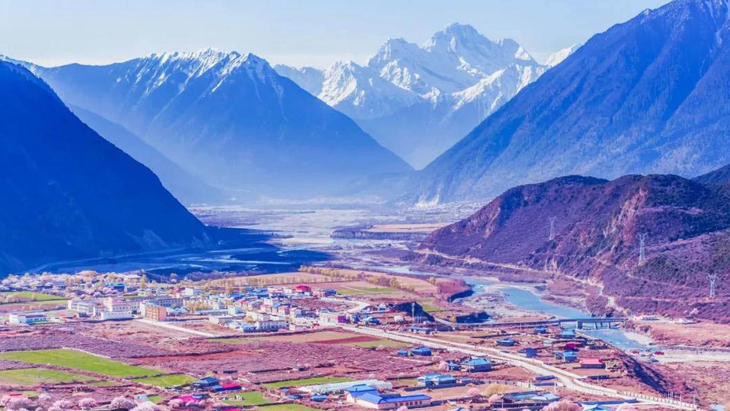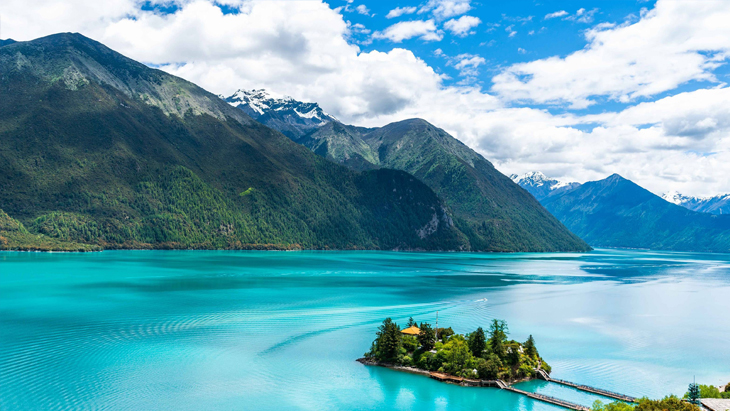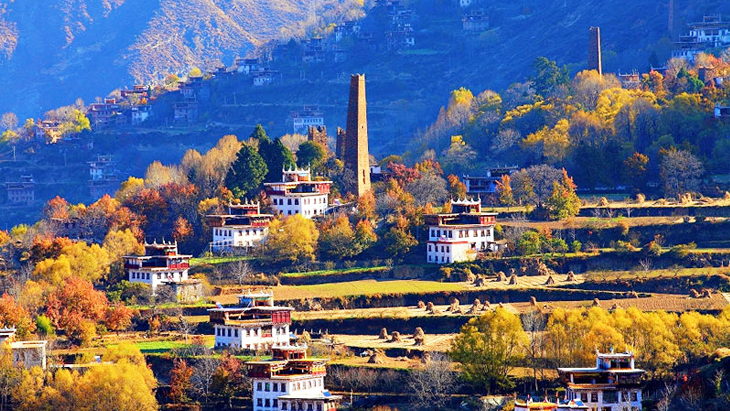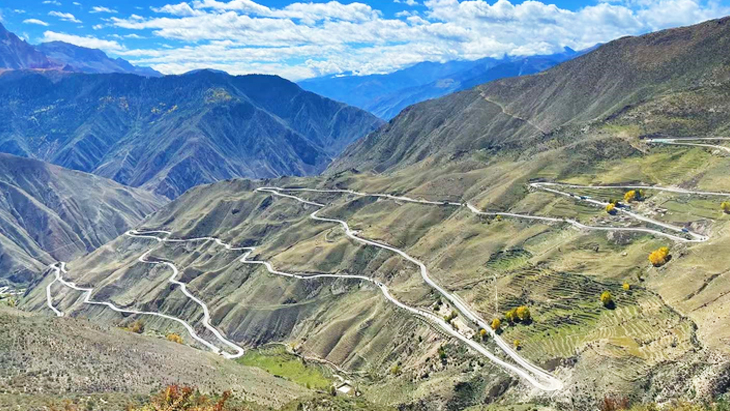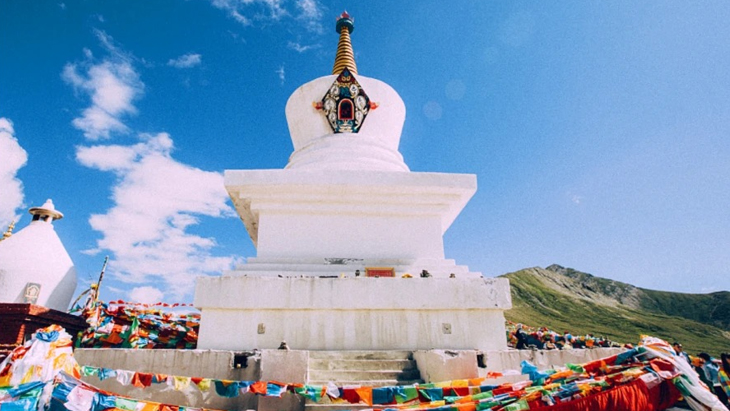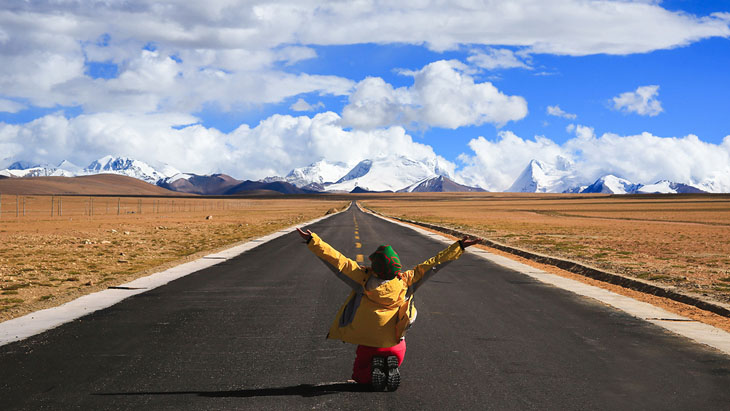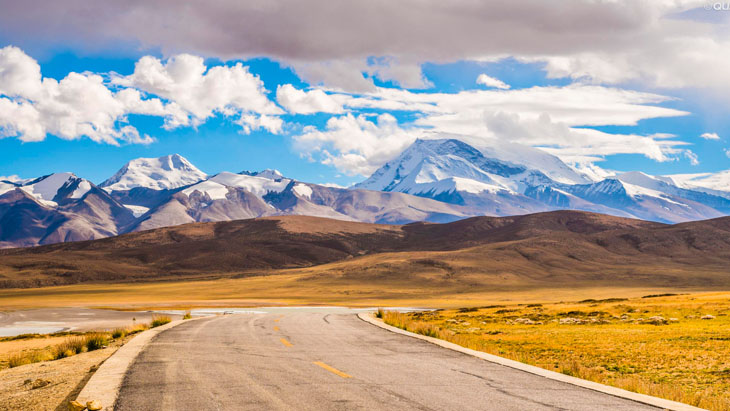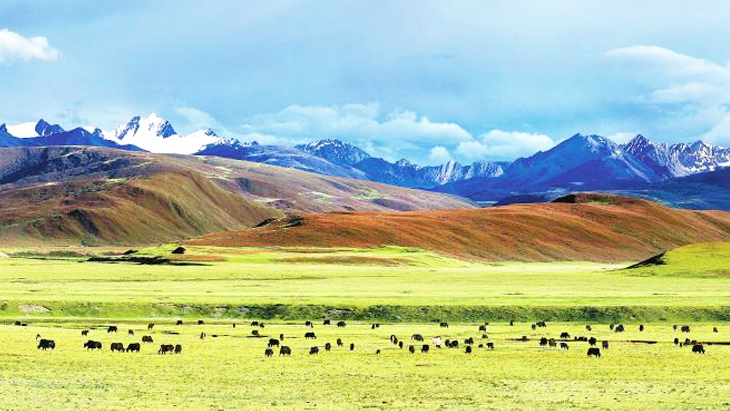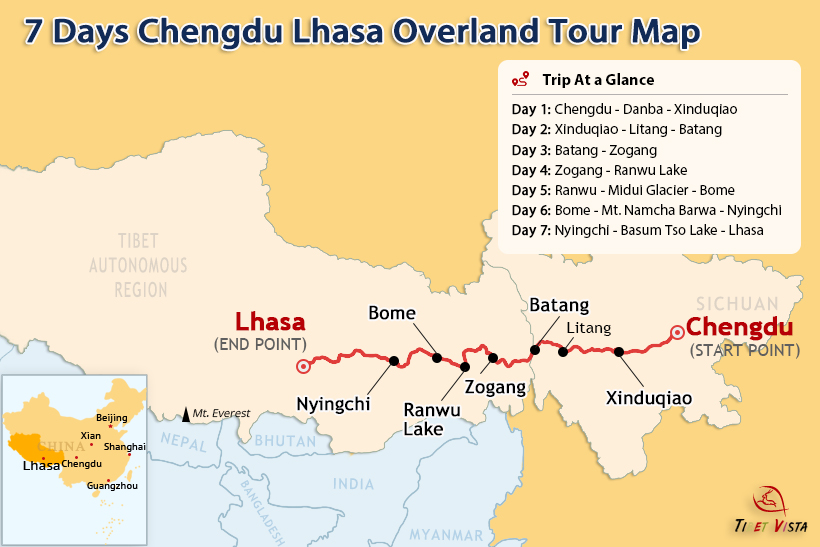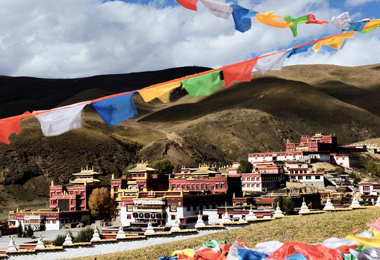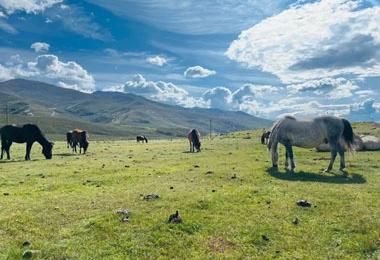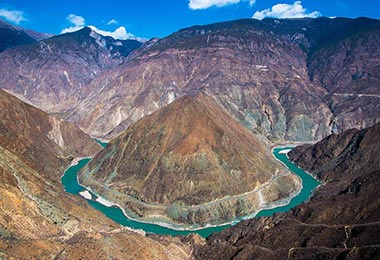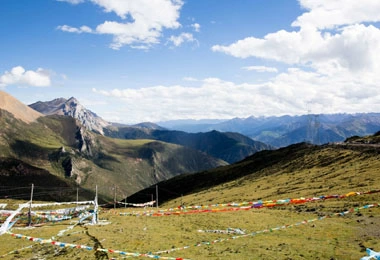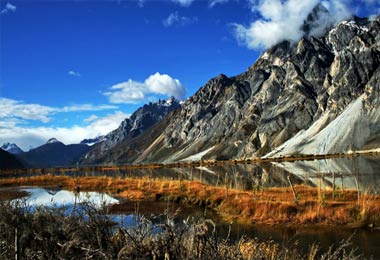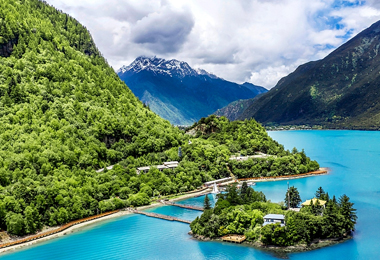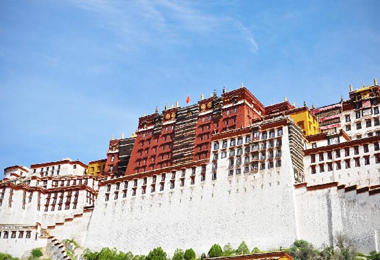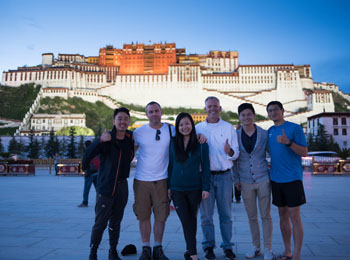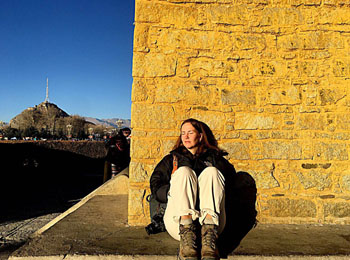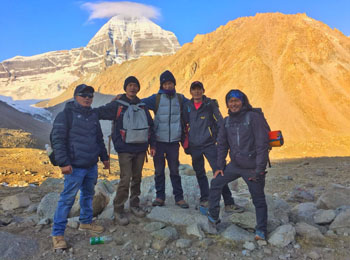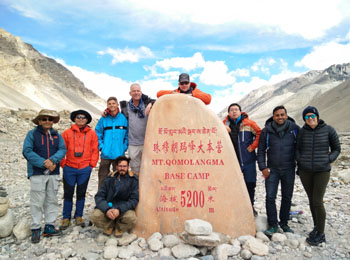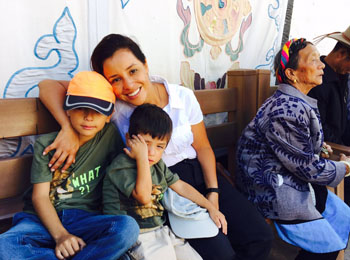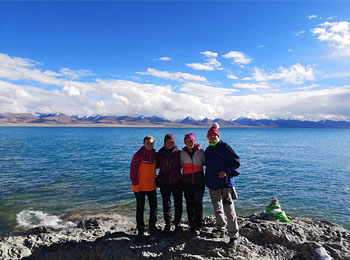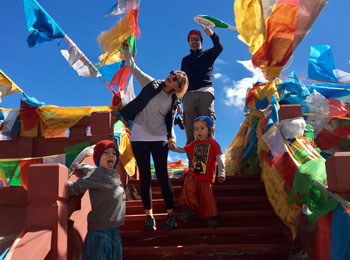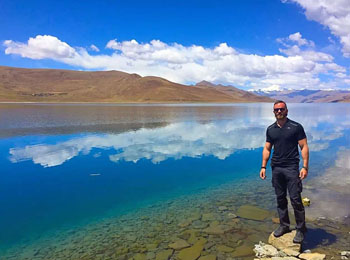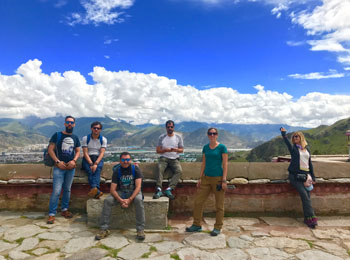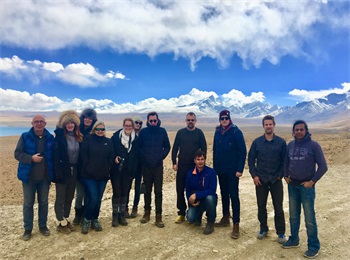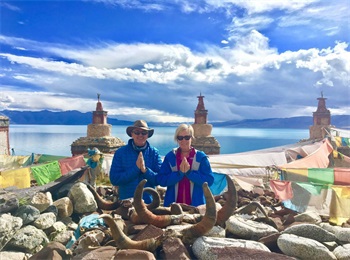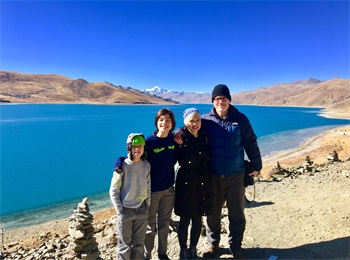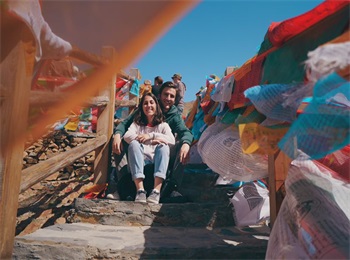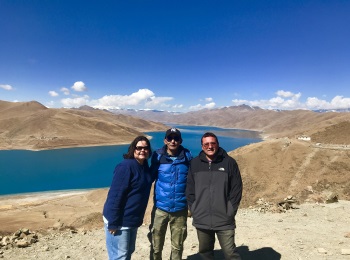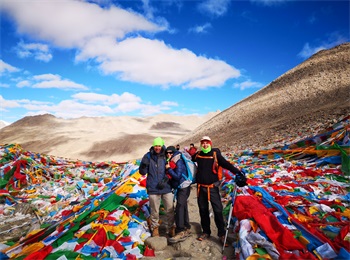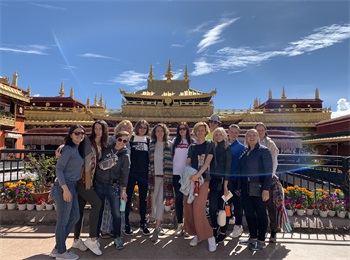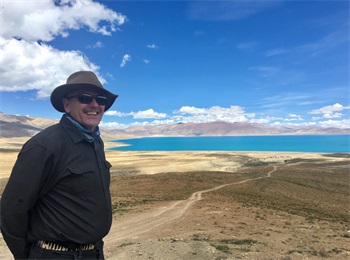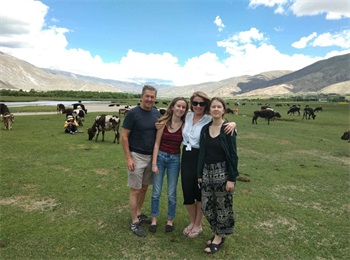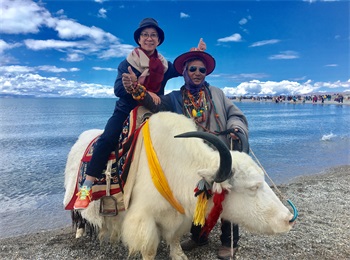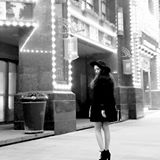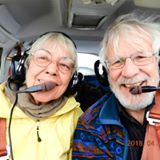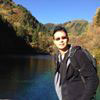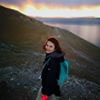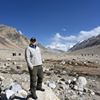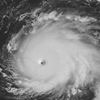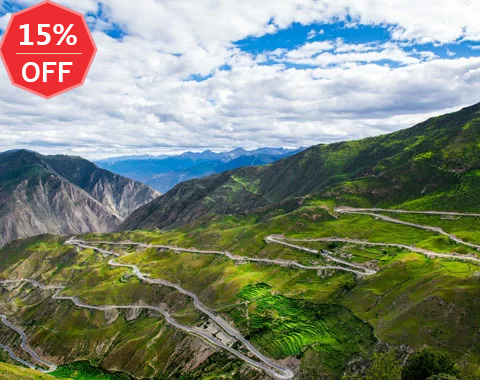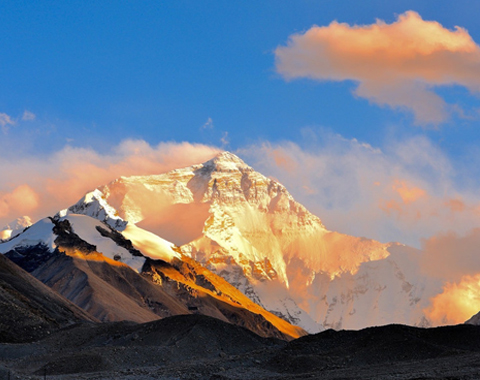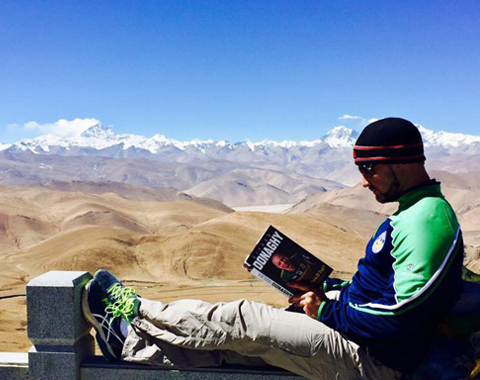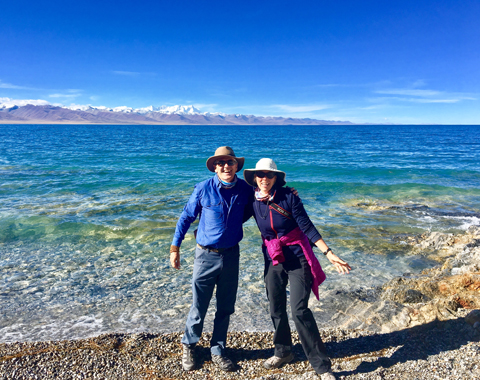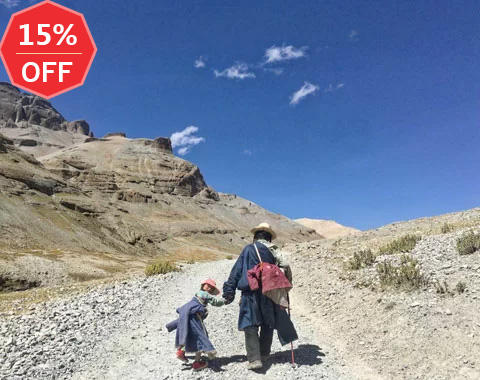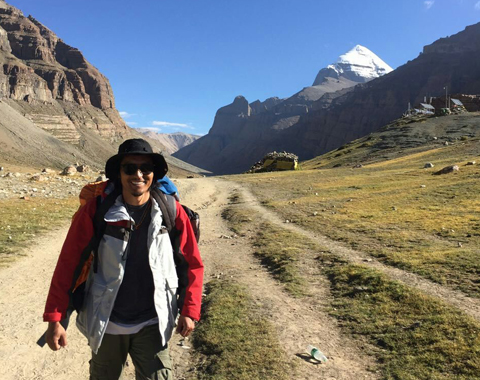7 Days Chengdu to Lhasa World-Class Overland Tour: Travel across the Top Scenic Road to Tibet from Chengdu via G318 National Highway
Tour Route: Chengdu - Xinduqiao - Litang - Batang - Zogang - Ranwu - Nyingchi - Lhasa

 Tour Code:
SG008B
Tour Code:
SG008B
 Tour Type:
Join-in Small Group Tour (Min 1 to Around 12) i
Tour Type:
Join-in Small Group Tour (Min 1 to Around 12) i
- Guaranteed Departures: Our tour dates are fixed, ensuring each departure is guaranteed.
- Flexible Scheduling: If you can't find a date that suits your travel plans, no need to worry. Simply let us know your preferred travel time, and we'll create a custom schedule, inviting others to join you.
- Non-shopping Experience: Embrace a non-shopping adventure with us. We promise high-quality tours, ensuring an authentic and enriching experience in Tibet.
 Tour Service:
Tibetan Local Tour Guide & Driver
Tour Service:
Tibetan Local Tour Guide & Driver
 Time to Vist:
April to October
i
Time to Vist:
April to October
i
- The best time to take this overland tour is spring (April and May) and autumn (September to October) for the most pleasant weather and finest landscapes along the way.
- Summer (July to August) is the rainy season. Pay attention to natural disasters such as mudslides in mountain areas. However, it is also the peak season for the overland tour from Chengdu to Lhasa.
- In winter (November to next March) the high-altitude mountainous areas along the route experience extremely low temperatures, and there's a possibility of encountering heavy snowfall and road closures.
 Trip Level:
Easy Trip for All Ages
i
Trip Level:
Easy Trip for All Ages
i
- Despite the Sichuan-Tibet Highway passing through mountain passes reaching altitudes of over 4000 meters, you can safely participate in our tour group if you are in good health.
- To ensure your health and safety, it is recommended that you seek professional medical advice before departure.

Travel along the most beautiful highway to Tibet and go in-depth to the Kham regions of Tibet in one go.

7 Days from USD1780
- This price is based on double occupancy;
- This price is based on 3-star accommodation level in low season;
- This price doesn’t include the international airfare.
Overview & Highlights of this Trip
This 7-day Chengdu to Lhasa overland tour is a world-class overland journey through the top scenic Sichuan-Tibet highway (G318) to Tibet. You will marvel at the diverse landscapes from Chengdu Plain to Tibet Plataeu, revealing breathtaking high mountains, canyons, rushing rivers, ethnic villages, and dense forests. Along this scenic route, you'll witness the intriguing historical evolution of Tibetan tribal culture, encountering the Kampa Tibetans and the Amdo Tibetans in their picturesque villages. Moreover, you will be amazed by the architectural marvels in the high mountain canyons, featuring tunnels, bridges, that command admiration worldwide.
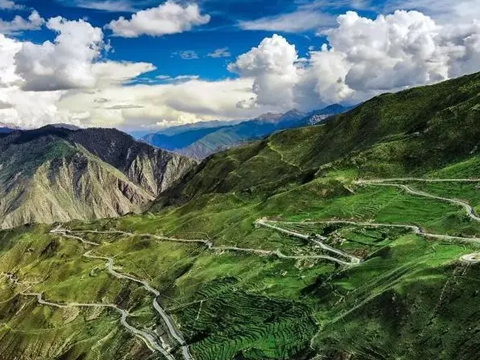
Highlight 1 of this Trip: TraversE the renowned G318, hailed as China's most picturesque highway, also known as the Sichuan-Tibet Highway.

Highlight 2 of this Trip: Go deep into the villages along the route and experience different customs in different Tibetan-inhabited areas along the Sichuan-Tibet Highway.

Highlight 3 of this Trip: Visit Nyingchi and explore the essence of Eastern Tibet.
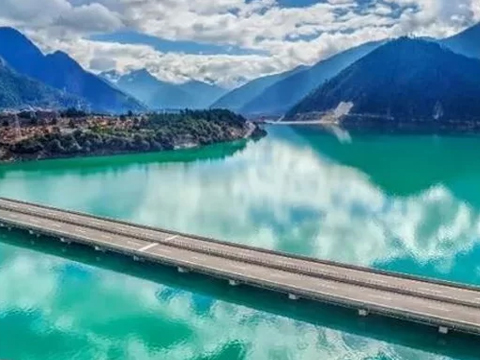
Highlight 4 of this Trip: Follow the new Lhasa-Nyingchi Expressway to the Holy City of Lhasa.
Itinerary Details
Trip at a Glance
Day 1: Chengdu - Kangding
Day 2: Xinduqiao - Batang
Day 3: Batang - Zogang
Day 4: Zogang - Baxoi - Ranwu Lake
Day 5: Ranwu - Midui Glacier - Bome
Day 6: Bome - Mt. Namcha Barwa - Nyingchi
Day 7: Nyingchi - Basum Tso Lake - Lhasa
Day 1: Chengdu - Mugecuo - Kangding (B)
Start your journey from Chengdu to Kangding, experiencing the transition from the plain to the plateau. You will meet the first snow-mountain above 4000 meters - Mt. Siguniang, and reach the first highland station - Xinduqiao.
In the morning, you will start the 450-kilometer journey from Chengdu to Xinduqiao. The first highlight of today’s journey is Mt. Siguniang, also known as the Four Sisters Mountain, which is the famous snow-capped mountain of the western Sichuan Plateau. You could see the four peaks standing side by side, have elevations of 5025 meters, 5276 meters, 5355 meters, and 6250 meters.
Then, you will pass through Danba County inhabited by Jiarong Tibetans. Danba County, also known as the Valley of Beauties, is adorned with watchtowers and many beautiful Tibetan girls.
Finally, you will arrive in Xinduqiao in the late afternoon. The play of light and shadow on the serene villages, lush meadows, tall shrubs, and rivers transforms Xinduqiao into a colorful dreamlike paradise.
You will rest in this gateway town to the Qinghai-Tibet Plateau, preparing for your journey into the Tibetan Plateau.
Stay overnight in Xinduqiao Town.
 Overnight in Xinduqiao
Overnight in XinduqiaoDay 2: Xinduqiao - Litang - Batang (B)
Entering the highest-altitude city in the Qinghai-Tibet Plateau, Litang and visit Ke’er Monastery, the largest Tibetan Buddhist temple along the G318 National Highway, and explore the vast grassland.
After breakfast, you will travel to Litang, the world’s highest-altitude city at 4015 meters. Along the way, you will visit the historic Ke’er Monastery, also known as Litang Monastery. Founded in 1580, it’s the oldest and largest Gelug sect Tibetan Buddhist temple in the Kham region, covering a vase area of over 500 acres and home to almost a thousand monks.
Then, continue your journey west to Batang. On the way, you will visit Maoya Prairie, a highland grassland surrounded by mountains. The vast green sea of grass, dotted with tents emitting light smoke, is traversed by cattle and sheep. If you are lucky, you may also have the opportunity to see antelopes, yellow ducks, marmots, and other wild animals on this grassland. Here, you will feel the vastness of the plateau and the lively energy of life, completely getting lost in the beauty of nature.
After that, you’ll finally reach today’s destination - Batang, a plateau city at an altitude of 2,575 meters. Staying at a lower altitude in Batang is good for your acclimatization, especially if you've recently entered the Qinghai-Tibet Plateau.
Stay overnight in Batang.
 Overnight in Batang
Overnight in Batang Breakfast
BreakfastDay 3: Batang - Jinsha River Gorge - Zogong (B)
Today is an adventure through the steep mountains and canyons along the Sichuan-Tibet Highway and enjoy the spectacular sight of the turbulent Jinsha River, Lancang River, and Nu River rushing down.
After breakfast, your overland journey continues to Zogong. First, you will pass through the most spectacular canyon area on the Qinghai-Tibet Plateau. Three major rivers, the Jinsha River, the Lancang River, and the Nu River, run side by side within a 300-kilometer area, rushing out like wild beasts from the deep mountains and canyons of the Qinghai-Tibet Plateau. These three rivers meander through the canyons and eventually rush down to become the Yangtze River, the mother river that nourishes Chinese civilization.
After passing through the steep canyon, you will continue to drive westward and climb over Mount Lawu with an altitude of 4358 meters, and Mount Dongda with an altitude of over 5130 meters. Standing at the mountain pass, looking far into the distance, the brown-red valley passing by is like a burning flame, while the Sichuan-Tibet Highway is like two bright ribbons shuttling between thousands of mountains and valleys.
Finally, you will arrive in Zogang. Stay overnight in Zogang.
 Overnight in Zogang
Overnight in Zogang Breakfast
BreakfastDay 4: Zogang - Nu River Grand 72 Turns - Baxoi - Ranwu Lake (B)
Today, you will face the exciting challenge of rapid descent of 1800 meters in altitude, crossing the most spectacular and exciting winding mountain road in the whole journey - the Grand 72 Turns of Nujiang River.
After breakfast, you will set off from Zogang and drive west to Bangda Grassland, the most important pasture in eastern Tibet. Here, herds of yaks and sheep roam leisurely on the vast grassland, and the pastoral scenery of the grassland will be displayed again.
Then, you will face an exciting challenge, descending from the Yela Mountain Pass at 4650 meters to the Nu River at an altitude of 2800 meters in just 12 kilometers. This section known as the "Nujiang River 72 Turns" is the most exciting section of the G318 National Highway to Tibet. Standing on the top of the mountain and looking down, the winding road is like a winding dragon. After countless 180-degree turns, it reaches the riverside. There is no end as far as the eye can see.
Continuing to drive west, snow-capped mountains, forests, and Tibetan villages gradually appear, taking you through the pastoral scenery of eastern Tibet.
Finally, you will arrive at Ranwu Lake, the most charming lake in eastern Tibet. Here is a beautiful ending to your journey today.
Stay overnight by the lake.
 Overnight by Ranwu Lake
Overnight by Ranwu Lake Breakfast
BreakfastDay 5: Ranwu - Midui Glacier - Bome (B)
Today, embark on a picturesque journey to Eastern Tibet. Marvel at snow-capped mountains, serene lakeshores, and uncovered hidden glaciers.
In the morning, you will visit Ranwu Lake, the most beautiful lake in eastern Tibet. The long and narrow blue lake and more than 20 kilometers of shoreline slowly lead you into forests, snow-capped mountains, flower-filled meadows, quiet and warm Tibetan countryside, and villages. It seems like a tranquil and peaceful place that people in the noisy city have found.
Then, your guide will take you to Midui Glacier, the most beautiful glacier in China and the lowest glacier in the world. Just like the elves in the snow-capped mountains hiding in the depths of the forest, the glacier rushes down from the main peak at an altitude of 6,800 meters to the ice tongue at an altitude of 2,400 meters close to the lake. Dense forests, blue lakes, and white glaciers complement each other, forming a dreamlike and dense Eden.
Especially in late autumn, the colorful forest makes this secret land as intoxicating as a fairy tale world. If you like, you can also choose to hike to the foot of the glacier to touch the huge ice tongue (optional).
After the trip, you will reach today’s final destination, Bome. Stay overnight in Bome.
 Overnight in Bome
Overnight in Bome Breakfast
BreakfastDay 6: Bome - Lulang Forest - Sejila Mountain (Mt. Namcha Barwa) - Nyingchi (B)
Today, you will step into the dense forest area and walk through the lush green forest.
In the morning, you'll leave Bome and continue driving east. You will find that the snow-capped mountains in front of you become more enchanting and the forest becomes denser. The snow-capped mountains are like diamonds set in the clear sky, which makes people dizzy. Under the snow-capped mountains is a vast forest, with white clouds floating between the snow-capped mountains and the forest.
After a while, you will come to Guxiang Lake hidden in the forest, climb to the pass of Sejila Mountain with an altitude of 4702 meters, and overlook the famous snow mountain at the eastern end of the Himalayas - Mt. Namcha Barwa. The towering Namcha Barwa Peak looks like a majestic spear, and the snow on the top of the mountain shines like diamonds in the blue sky.
Continuing forward, you will come to the second observation deck for viewing the Namcha Barwa Peak - Lulang Forest Platform. Here, you will once again appreciate the stunning beauty of Namcha Barwa Peak standing above the vast forest sea and cutting through the sky.
After appreciating the visual feast brought by the snow-capped mountains and forests, you will arrive at Lulang International Tourism Town. After arriving, you can enjoy the delicious food of Lulang Forest, stroll through the town, and feel the peaceful and leisurely atmosphere.
That night, you will arrive at Bayi Town in Nyingchi City, the most prosperous area in eastern Tibet. Here, you have the opportunity to taste the famous Stone Pot Chicken in Nyingchi (optional).
Stay overnight in Nyiching City (Bayi Town).
 Overnight in Nyingchi
Overnight in Nyingchi Breakfast
BreakfastDay 7: Nyingchi - Basum Tso Lake - Lhasa (B)
Today, you will conclude the final stretch of the journey in eastern Tibet, explore the Basumtso Lake , and finally drive to the holy city of Lhasa.
After breakfast, the tour guide will lead you to Basum Tso Lake for a tour. Compared with other lakes in Tibet, Basum Tso Lake is the holy lake of the Tibetan Red Sect. The island in the middle of the lake is like a quiet water garden, with blue waves surrounding the island and ancient trees covering the temple. It is completely different from other temples and attractions on the Sichuan-Tibet highway. Here, you will board the Tsozong Gompa Temple, a thousand-year-old temple on a small island in the middle of the lake, and experience the ancient and profound religious culture.
Then, you will drive to the holy city of Lhasa via the highway connecting Lhasa and Nyingchi. On the way, there is a section passing through the Nyang River, which will give you a wonderful feeling of flying above the blue ocean.
When you see the majestic Potala Palace, it means that the long and exciting journey on the Sichuan-Tibet Highway is at the end.
Upon arrival, the tour guide and driver will take you to the hotel to check in, where you can wash away the travel dust.
End the tour in Lhasa.
Notice:
If you want to continue your journey to other part of Tibet, like Shigatse, the Everest Base Camp, and Mount Kailash, please feel free to tell us. We offer many wonderful tours to other destination in Tibet starting from Lhasa.
 Overnight in Lhasa
Overnight in Lhasa Breakfast
BreakfastTour Cost & Schedule in 2024
| Class/Price for P.P | Sept. 30 |
|---|---|
| Economic Class (3-Star Hotels) | 1780 US$ |
Please Note:
If you couldn’t find a tour date suitable for your travel schedule in the above form, please contact our travel experts and they will help you plan a delightful vacation to Tibet at the BEST local price.
Discount:
1.) 5% off for those booking the tour together with other two travelers (3 or 3 above in total) at the same time;
2.) 5% off for those booking the tour 3 months in advance;
3.) Please kindly be aware that the two discounts mentioned above cannot be enjoyed simultaneously.
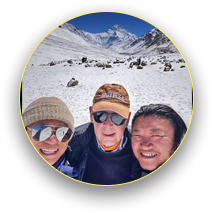
From Tibet travel permits to local accommodations and transportation, we've got you covered. While train and flight tickets to Tibet are not included, we ensure seamless and 100% guaranteed booking for your convenience.
Your Tibet tour experience starts with us!
Price Inclusions:
Tibet Travel Permit and all required local travel documents for this tour (excluding expedited processing fees);
Local tour transfers, 5-15 seats comfortable tourist vehicle according to the group size;
All entrance ticket fees for all tourist sites listed in the itinerary;
All meals listed in the itinerary;
Knowledgeable English-speaking local tour guide shared in your group (For prices of tour guides in other languages, please inquire);
All hotels listed in the itinerary or equivalent three-star hotels. Upgrades are available for an additional fee. (Single room supplement required when not sharing the room);
Free airport pick up at Chengdu airport one day before the tour start;
Service Charge & Government Taxes;
Tourist accident/casualty insurance;
Additional services include fine Tibetan souvenirs, a tourist map, portable oxygen, medical oxygen in the vehicle, bottled mineral water, and more.
Price Exclusion:
Domestic flight/train to Chengdu and flight/train out of Lhasa;
Single Room Supplement: Hotels default to double occupancy with twin-bedded rooms. If you prefer a single room or room sharing isn't possible, a single room supplement is necessary. Please consult the travel consultant for specific pricing details.
Meals not listed in the itinerary;
Tips for the guide and driver. If you are satisfied with their service, it is suggested to provide a combined tip of around 7 USD/50 RMB per guest per day;
Other expenses caused by force majeure events (such as natural disasters, traffic control, loss of valuables, visa delays, flight delays or cancellations, etc.);
Personal expenses, like laundry, phone calls, snacks, soft drinks (please do your best to avoid alcoholic beverages during your Tibet trip), optional tour activities, etc.
Chengdu to Lhasa Overland Trip Notes
First, you need to apply for a Chinese Group Visa from the Chinese Embassy in Kathmandu. Make sure you don’t have a Chinese Visa, or your former visa will be canceled once the group visa is issued.
Then, you also need the Tibet Travel Permit to enter the Tibet Autonomous Region.
We’ll take care of Tibet Travel Permit, as well as other local travel documents as part of our tour package. Simply follow our guidance, and there’s no need to worry about the process.
Once you book your Chengdu to Lhasa tour with us, simply provide the scanned copy of your valid passport (with at least 6 months of validity) and your Chinese Visa.
Generally, it takes 7-14 working days to process the Tibet Travel Permit. Our local travel guide will take the permit to you while meet you at Chengdu.
To ensure a smooth journey, it is recommended to book the tour at least 15-20 daysbefore departure.
Of course, booking 1 or 2 months or even earlier will help us apply for necessary travel documents on your behalf and make advance reservations for accommodations.
Additionally, early booking provides the opportunity to enjoy early bird discounts. The earlier you book, the better prepared you'll be, and you won't be troubled in a rush.
The best time to travel from Chengdu to Lhasa by land is in Spring (April to early June) and Autumn (September to October).In both spring and autumn, the weather remains consistently stable, warm, and delightful. In spring, you will enjoy the blooming mountain flowers on the way, while in autumn, you will appreciate autumn foliage and snow-capped peaks.
Summer (July to August) is the rainy seasonof the areas along the Sichuan-Tibet highway, and natural disasters such as mudslides may occur on some sections of the road.
Winter (November to March) may not to be ideal for travel due to snowy roads and potential road closures.
The Sichuan-Tibet highway connecting Chengdu and Lhasa passes through the Hengduan Mountains. The altitude changes a lot during the drive, and you’ll go up many mountains over 4000 meters above sea level.
Check the altitude of major attractions along the way as below:
Xinduqiao3460m| Attractions | Altitude |
|---|---|
| Chengdu | 500m |
| Litang | 4014m |
| Batang | 2500m |
| Mount Lawu | 4358m |
| Mount Dongda | 5086m |
| Zogang | 3750m |
| Ranwu Lake | 3850m |
| Bome | 2720m |
| Sejila Mountain | 4702m |
| Bayi (Nyingchi) | 2994m |
| Lhasa | 3658m |
To avoid altitude sickness, plan your itinerary wisely and include enough rest time. Stay hydrated by drinking plenty of water, avoid alcohol and excessive exertion. Maintaining a positive attitude helps prevent discomfort.
It's advisable to consult a doctor for altitude sickness medication as a precaution.
If you experience severe symptoms like hypersensitivity, intense headaches, or difficulty breathing during the trip, promptly use oxygen, inform the tour guide, and seek immediate medical attention with their assistance.
The Sichuan-Tibet highway is 2159 kilometers long, connecting Chengdu and Lhasa. Renowned as the most beautiful highway to Tibet, it traverses the Hengduan Mountains and the Himalayas, navigating through diverse terrains such as plains, hills, and mountains.
The road conditions along the way are complex. Although road conditions have improved this year, some road sections may still be affected by natural disasters caused by bad weather, resulting in poor road conditions. It is recommended to contact us before traveling to obtain the latest traffic information on the Sichuan-Tibet Line.
While the Sichuan-Tibet Highway is a well-established tourist route, the towns along the way are scarce, and accommodation options are limited. Cities like Chengdu and Nyingchi offer a diverse range of lodging choices. However, in smaller towns such as Xinduqiao and Litang, accommodations are mostly in the form of hotels or small inns, providing a comfortable and clean stay.
Clothes: No matter when you visit Lhasa and Shigatse, you need to prepare warm clothing for the cold night at the Tibetan Plateau. To ensure comfort, opt for warm, windproof outerwear, and consider layering to adapt to temperature fluctuations. In summer, lightweight clothing is suitable, while during spring and autumn, it's advisable to wear at least three layers (undershirt, sweater, outerwear). In winter, prioritize warmer clothing with wind protection. Additionally, due to strong ultraviolet rays, don't forget to wear sunglasses and a hat.
Personal Care: Pack your essentials such as a toothbrush, toothpaste, facial cleanser, towels, and other personal toiletries. Since there are no shower facilities at Everest Base Camp, consider bringing wet wipes for convenience.
Skincare: Due to the dry climate in Tibet, pack lip balm, moisturizing cream, and hydrating masks to prevent skin dryness and cracking.
Sun Protection: Don’t forget to bring sunscreen and sunglasses for effective sun protection against the strong UV rays in Tibet.
Additional Necessities: Considering the long distances between attractions in Tibet, bring a U-shaped pillow for a comfortable journey. Also, having a thermal flask ensures you have hot water whenever needed.
Common Medications: Take essential medications like motion sickness pills, gastrointestinal medicine, anti-inflammatory drugs, cold medicine, and other medications for emergencies. Include adhesive bandages and eye drops. (Consult your doctor and carefully follow medical advice when taking medication.)
Electronic Devices: Bring your phone, camera, power bank, and any other necessary electronic devices. If you plan to bring a drone, check with our travel consultant in advance. Tibet operates on a 220V voltage.
Cash and Cards: Alipay and WeChat Pay are commonly accepted in major cities such as Chengdu, Nyingchi, and Lhasa. While credit cards are usable in some large hotels, restaurants, and shopping malls in big cities, it's important to note that in some small towns along the way, cash might be essential. To ensure convenience, it's recommended to carry a small amount of Chinese yuan and at least one bank card with you.
Contact us for your dream trip now !
Enquire NowYou May Also Like:
-
![15 Days World-Class Overland Route: Chengdu to Lhasa via G318 National Highway]() 15 Days World-Class Overland Route: Chengdu to Lhasa via G318 National HighwayView Details
15 Days World-Class Overland Route: Chengdu to Lhasa via G318 National HighwayView DetailsFrom USD2470 p.p
Tour Route: Chengdu - Kangding - Xinduqiao - Litang - Markam - Zogang - Ranwu - Nyingchi - Lhasa - Shigatse - Lhasa
The Sichuan-Tibet highway is the most dangerous but most beautiful road route, where you can feel the real nature from Chengdu Plain to the Tibetan Plateau.
-
![8 Days Lhasa to Everest Base Camp Small Group Tour]() 8 Days Lhasa to Everest Base Camp Small Group Tour: Marvel at Mt.Everest Real Close from 4 Different Viewing PlatformsView Details
8 Days Lhasa to Everest Base Camp Small Group Tour: Marvel at Mt.Everest Real Close from 4 Different Viewing PlatformsView DetailsFrom USD939 p.p
Tour Route: Lhasa - Gyantse - Shigatse - Everest Base Camp - Shigatse - Lhasa
Almost all the itineraries covering Everest Base Camp originate from this classic itinerary. The travel route to EBC involves all the awe-inspiring attractions, religious sites and magnificent natural wonder.
-
![7 Days Lhasa to Kathmandu Overland Small Group Tour]() 7 Days Lhasa to Kathmandu Overland Small Group Tour: Traverse from the North Side to the South Side of Mt.Everest for the Best of the HimalayasView Details
7 Days Lhasa to Kathmandu Overland Small Group Tour: Traverse from the North Side to the South Side of Mt.Everest for the Best of the HimalayasView DetailsFrom USD979 p.p
Tour Route: Lhasa - Gyantse - Shigatse - Everest Base Camp - Gyirong - Kathmandu
This tour combines the classic itinerary of visiting Tibetan cultural and natural beauty with a stopover in EBC. Tourists will finally end up in Kathmandu via Gyirong.
-
![10 Days Lhasa to EBC and Namtso Lake Small Group Tour]() 10 Days Lhasa to Everest Base Camp and Namtso Lake Small Group TourView Details
10 Days Lhasa to Everest Base Camp and Namtso Lake Small Group TourView DetailsFrom USD1289 p.p
Tour Route: Lhasa - Gyantse - Shigatse - EBC - Shigatse - Lhasa - Namtso Lake - Damxung - Lhasa
The travel route to EBC & Namtso Lake involves all the awe-inspiring attractions, religious sites and magnificent natural wonder in Tibet.
-
![13 Day Lhasa Mt. Everest Mt. Kailash Lake Manasarovar and Kathmandu Adventure Tour]() 13 Day Lhasa, Mt. Everest, Mt. Kailash, Lake Manasarovar and Kathmandu Adventure TourView Details
13 Day Lhasa, Mt. Everest, Mt. Kailash, Lake Manasarovar and Kathmandu Adventure TourView DetailsFrom USD2059 p.p
Tour Route: Lhasa - Gyantse - Shigatse - EBC - Saga - Darchen - Kailash Trek - Darchen - Saga - Gyirong - Kathmandu
This 13-day adventure tour covers the highest peak - Mount Everest, the holy Mount Kailash and Lake Manasarovar, which will lead you to appreciate the epic Himalayas, enjoy the sacred Kailash Kora, and drive to Nepal via Gyirong Port.
-
![15 Days Kailash and Manasarova Tour]() 15 Days Kailash and Manasarova Small Group Tour: A pilgrim’s final fantasy and the greatest overland trip in Tibet.View Details
15 Days Kailash and Manasarova Small Group Tour: A pilgrim’s final fantasy and the greatest overland trip in Tibet.View DetailsFrom USD2059 p.p
Tour Route: Lhasa - Gyantse - Shigatse - E.B.C - Saga - Kailash Trek - Darchen - Lake Manasarovar - Saga - Gyirong - Tingri - Lhasa
This is truly a journey to feel, magnificent temples, mountain passes, snow-capped peaks, nomad camps, pilgrims of Tibet. Start the trip from exploring the heart of central Tibet.
Get Started - 7 Days Chengdu to Lhasa World-Class Overland Tour: Travel across the Top Scenic Road to Tibet from Chengdu via G318 National Highway
You’re getting closer to your dream Tibet vacation! Fill out this form so our travel designers can start helping you plan a trip.
Privacy Policy: Your information is kept strictly confidential. Tibet Vista will never sell, trade, or give away your contact information to a third party.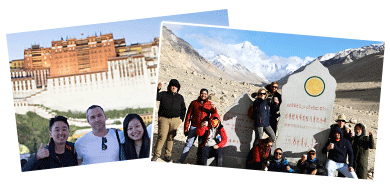

.jpg)



 View Trip
Map
View Trip
Map
 5.0
5.0 